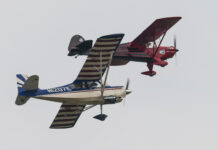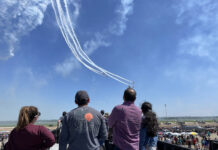It is an axiom in the air show business that a skilled air boss can make a good air show great, but what is less obvious is that a bad air boss can leave even the best show in disarray. There are plenty of professional bosses who work full-time at shows all over the country, and many who work only a single show each year. Clearly, however, not all bosses are created equal. Although many single-show bosses are very effective, the limited nature of their experience may potentially create a deficit of understanding or standardization. Similarly, professional multi-show bosses can get into a rut, becoming rigid and defensive, unwilling to admit to or change poor habits or to try new techniques. And a “my way or the highway” attitude can sometimes characterize both types of problems.
There is another more basic issue when it comes to the fundamentals of being a good air boss. Whether you are an aviator or a doctor, a mechanic or an architect, there are few professional positions where continual training is not highly encouraged or even mandatory. Yet all of these professional groups have strict adherence to standardization in their training—both initial and recurring. Air bosses, unlike almost all other professional groups, must regulate and educate themselves. There is currently no requirement for anyone who wishes to be an air boss to prove that they have any experience or knowledge of any kind. This puts responsibility for selecting a sufficiently skilled, trained, and experienced air boss squarely in the lap of the event organizer. Fortunately, there are ways to address these concerns and ensure that your show is as safe and successful as possible.
The first is air boss selection. Most air show veterans recognize that it is a mistake to judge an air boss on how he/she handles himself when the sun is shining and all of the planes are where they’re supposed to be when they’re supposed to be there. A quality air boss earns his paycheck and his reputation when—as sometimes happens—the situation deteriorates. Your air boss should be able to demonstrate a depth of understanding that will allow him or her to continue operating calmly and effectively event when storm clouds—both actual and figurative—are gathering.
It is also prudent to judge an air boss on his or her ability to put personal issues and problems aside for the good of the event. This is not an appropriate time to be worried about doing favors for friends or bruising delicate egos. The air boss must be a self-possessed and capable individual whose primary mission is safety, and should have the background and experience to support their skills.
A second method of ensuring that your air boss is at the top of his or her game is to encourage or even pay for them to attend the Air Boss Academy or one of the other ICAS workshops. Whether your chosen air boss is an experienced professional or brand-new to the industry, strong skills cannot be honed by merely attending air shows. A collaborative effort between ICAS and some of the profession’s most accomplished and respected bosses has produced a series of educational seminars and workshops designed to share techniques and information and to educate bosses to the highest standard possible.
Although it is not required that the workshops be attended in any particular order, the information presented does have a linear progression which is especially helpful for an individual who is new to the profession. Air Shows 101, Air Boss 201 and the Air Boss Academy are all recommended and endorsed by ICAS.
Air Shows 101 is the ‘Air Ground Operations Training Seminar’ and is presented each year at the ICAS Convention. The objective of the seminar is, “…to provide a fundamental understanding of the regulations, logistical requirements, personnel, equipment, and coordination required to conduct a safe and successful air show.” These are basics that are required not only of the air show organizer, but also of the air boss. The boss should be intimately familiar with the timeline of show-building as well as how all of these aspects —TFRs, waivers, show layout and so on — affect the logistics of the show itself.
Air Boss 201 is also available annually at the convention. It has the ultimate goal of providing the aviation community with air bosses who can enhance flight operation safety, assure compliance with the FARs at aviation events, and have personally achieved a set of qualifications that will allow them to prepare for and handle the many situations that may arise. This seminar, in conjunction with the Air Boss Academy, is designed to increase the standards of operation for all air bosses to the highest level possible.
The Air Boss Academy is hosted by actual air shows across the country and is an opportunity to have an intimate, inside view of the role and operation of the air boss in real time. By observing one boss at work while having thorough classroom-style discussions with another, all aspects of the responsibilities and requirements of a good air boss are covered. This is an in-depth seminar that will leave the student with a good working knowledge of safety concerns, event planning, schedule management, phraseology and much more.
These classes are the best defense our industry has against the ever-present dangers of ignorance and inertia. The most up-to-date information and insights shared with others of the same profession will give us all a greatly enhanced air show experience. There are a massive number of variables that can affect your air show, and many of them are completely beyond your control. The abilities of your air boss should never be in question. It is up to you to both do all you can to ensure the safety and success of your event, and educational resources are key tools you need to achieve the best results.








